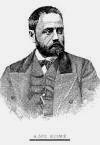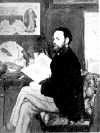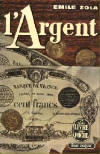
It Happened
in History!
(Go to
It Happened in History Archives)
|
Zola received his education at the College Bourbon. When he turned 18, he moved back to Paris with his mother. There, he began writing under the influence of the romantics while befriending painter Paul Cézanne. Their friendship ended later over Zola's fictionalized depiction of Cezanne and the Bohemian life of painters in his novel, L'Oeuvre (The Masterpiece, 1886).
Unique for his time, Zola was one of the first novelists to research his topics as if he were writing a newspaper article instead of a novel. He interviewed experts and recorded in the smallest detail on the subjects in his books. When he wrote about a train engineer, he spent days riding in the front car of a train. When he wrote about miners, he visited the coalmines nearby. During his formative years, he wrote several short stories and essays, four plays, and three novels. Among his early books was Contes a Ninon, published in 1864. When his sordid autobiographical novel, La Confession de Claude (The Confessions of Claude, 1865), was published and attracted the attention of the police, Zola was fired from Hachette.
The family had two branches. The Rougons were small shopkeepers from a low social class, while the Marquarts were poachers and smugglers who had problems with alcohol. Some members of the family would rise during the story to the highest levels of society while others fell victim to societal evils or heredity. Zola presented the idea to his publisher in 1868.
Zola said, "I'm not very concerned with beauty or perfection.... All I care about is life, struggle, intensity." He achieved all that and more when, in 1998, the Paris daily, L'Aurore, published Zola's J'accuse on the front page. It ran in the form of an open letter to the President, Félix Faure. The piece accused the French government of anti-Semitism and wrongfully jailing Jewish army captain Alfred Dreyfus. In a case that quickly commanded international attention, Dreyfus had been convicted of espionage and sent to Devil's Island.
Zola said "The truth is on the march, and nothing shall stop it." In 1906, Dreyfus was entirely exonerated by the Supreme Court. Emile Zola was not so fortunate. On September 28, 1902, he was overcome by carbon monoxide fumes while he slept. According to some speculations, his political enemies had blocked the chimney of his apartment, causing poisonous fumes to build up and kill him. At Zola's funeral, Anatole France declared, "He was a moment of the human conscience." In 1908, Zola's remains were transported to the Panthéon. Although naturalism as a literary influence fell out of favor after his death, Zola's integrity and intensity had a profound influence on writers such as Theodore Dreiser, August Strindberg, and Emilia Pardo-Bazan. Discover Emile Zola
Indulge
Yourself - Check Out Today's Best-Selling |
- HOME -






